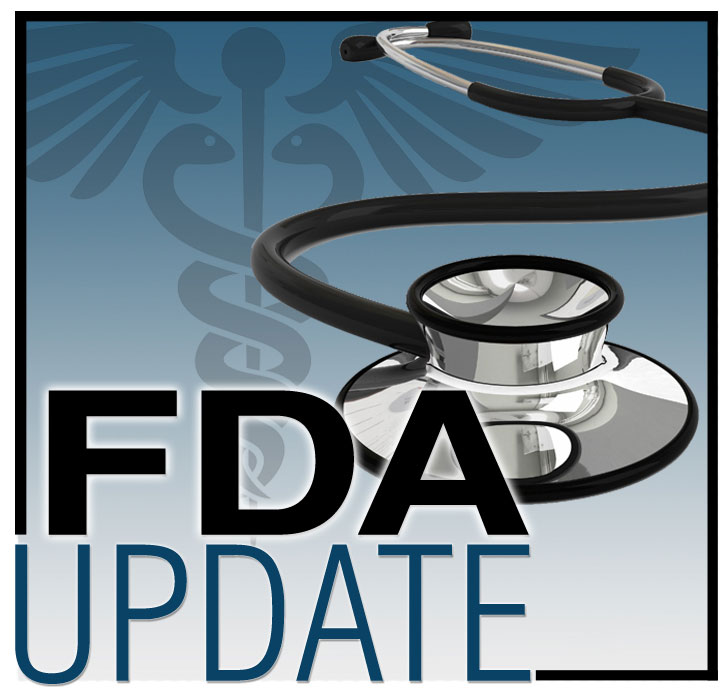
On May 26, 2017, the U.S. Food and Drug Administration (FDA) granted regular approval to ceritinib (Zykadia®, Novartis Pharmaceuticals Corp.) for patients with metastatic non-small cell lung cancer (NSCLC) whose tumors are anaplastic lymphoma kinase (ALK)-positive as detected by an FDA-approved test.
In April 2014, ceritinib received accelerated approval for patients with ALK-positive metastatic NSCLC whose disease has progressed or who are intolerant to crizotinib based on a blinded independent review committee (BIRC)-assessed overall response rate (ORR) of 44% among 163 patients in a single-arm trial.
The current approval is based on data from ASCEND-4, a randomized, multicenter, open-label, active-controlled trial conducted in patients with untreated ALK-positive NSCLC. All patients were required to have evidence of ALK-rearrangement identified by the VENTANA ALK (D5F3) test performed through central laboratory testing.
ASCEND-4 randomized 376 patients (1:1) to receive either ceritinib (n=189) 750 mg orally once daily until disease progression or platinum-pemetrexed doublet chemotherapy (n=187). Patients in the chemotherapy arm received pemetrexed (500 mg/m2) with either cisplatin (75 mg/m2) or carboplatin (AUC 5-6) on day 1 of every 21-day cycle for up to 4 cycles, followed by pemetrexed maintenance therapy.
ASCEND-4 randomized 376 patients (1:1) to receive either ceritinib (n=189) 750 mg orally once daily until disease progression or platinum-pemetrexed doublet chemotherapy (n=187). Patients in the chemotherapy arm received pemetrexed (500 mg/m2) with either cisplatin (75 mg/m2) or carboplatin (AUC 5-6) on day 1 of every 21-day cycle for up to 4 cycles, followed by pemetrexed maintenance therapy.
In patients with measurable central nervous system (CNS) lesions on baseline brain scans, the confirmed overall intracranial response rate (OIRR), assessed by BIRC neuro-radiologist, was 57% (95% CI: 37%, 76%) in the ceritinib arm and 22% (95% CI 9%, 42% in the chemotherapy arm. The median CNS response duration was 16.6 months (95% CI: 8.1, NE) and not estimable (95% CI: 1.5, NE) in the ceritinib and chemotherapy arms, respectively.
The most common adverse reactions (occurring in at least 25% of ceritinib-treated patients in ASCEND-4) were diarrhea, nausea, vomiting, fatigue, abdominal pain, decreased appetite, and cough. Serious adverse reactions occurred in 38% of patients treated with ceritinib. Adverse reactions leading to ceritinib discontinuation occurred in 12%. Adverse reactions that led to ceritinib discontinuation in 1% or more of patients were increased creatinine, increased amylase, and increased lipase. Dose interruption due to adverse reactions occurred in 77% of ceritinib-treated patients, while dose reductions were required in 66%.
The recommended ceritinib dose is 750 mg orally once daily, to be taken at least 1 hour before or at least 2 hours after a meal.
Full prescribing information is available.
FDA previously granted ceritinib Breakthrough Therapy Designation for the first-line treatment of ALK-positive metastatic NSCLC with metastases to the brain. The application was granted Priority Review. A description of FDA expedited programs is in the Guidance for Industry: Expedited Programs for Serious Conditions-Drugs and Biologics.
Healthcare professionals should report all serious adverse events suspected to be associated with the use of any medicine and device to FDA’s MedWatch Reporting System by completing a form online, by faxing (1-800-FDA-0178) or mailing the postage-paid address form provided online, or by telephone (1-800-FDA-1088).
Follow the Oncology Center of Excellence on Twitter @FDAOncology
Check out recent approvals at the OCE’s new podcast, Drug Information Soundcast in Clinical Oncology (D.I.S.C.O.).
In collaboration with the FDA and as a service to our members, ONS provides updates on recent FDA approvals and other important FDA actions (e.g., updated safety information, new prescribing information) pertaining to therapies for patients with cancer. This allows the agency to inform oncologists and professionals in oncology-related fields in a timely manner. Included in the FDA updates is a link to the product label or to other sites for additional relevant clinical information. In supplying this information, ONS does not endorse any product or therapy and does not take any position on the safety or efficacy of the product or therapy described.





